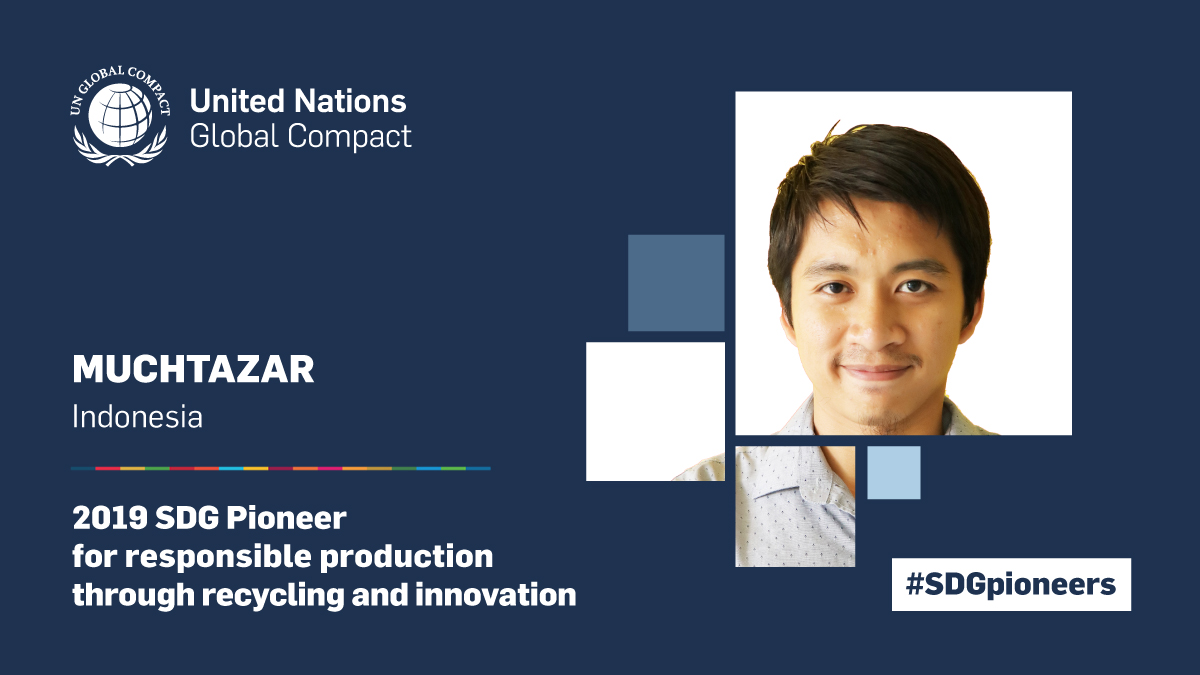An SDG Pioneer for responsible production through recycling and innovation

Muchtazar is wielding his environmental engineering degree to develop a waste management system that has helped hundreds of thousands of people from 37 Indonesian cities recover nearly 7,800 tonnes of inorganic waste.
As an environment and sustainability executive at Unilever Indonesia, Muchtazar helps manage a waste collection system that works directly with communities to reduce the pileup of inorganic waste in streets, yards, lots and landfills throughout a dozen Indonesian provinces.
The Unilever Waste Bank System, which was evolved from its initial concept in 2008, is aligned with Unilever’s vision to help Indonesia achieve the Sustainable Development Goals (SDGs) by 2030, with an emphasis on Goal 12 (Responsible Consumption and Production). The 2018 recovery of nearly 7,800 tonnes is an improvement of 27 per cent over the previous year and helped nearly 430,000 people, up 25 per cent over 2017, while generating more than US$ 700,000 in economic incentives.
Muchtazar also uses the Waste Bank System to successfully power CreaSolv®, an innovative technology that recycles multilayer, flexible plastic waste. The waste bank program, which initially focused on community education, was expanded to collect flexible plastic waste from communities.
Muchtazar ramped up the program by setting competitive collection targets among waste banks and collaborating with local non-governmental organizations to gather support in the field. The collaborative efforts yielded results of tonnes of flexible plastic waste recovery between 2017 to 2018, to feed the CreaSolv® technology and make it work successfully.
Unilever has set a 2025 target for making 100 per cent of its plastic packaging recyclable, reusable and compostable. To expand the power of Unilever’s work in Indonesia to achieve Goal 12, Muchtazar became involved in the PRAISE (Packaging and Recycling Alliance for Indonesia Sustainable Environment) initiative in 2017. The alliance is composed of six top consumer goods companies, including Unilever. Muchtazar’s most significant contribution to PRAISE was to coordinate the packaging waste dropbox program for 100 points in Jakarta. The initiative raises people’s awareness of Goal 12.
The Ten Principles are embedded in Unilever’s activities around the world as the Code of Business Principles. Muchtazar acknowledges the difficulty of implementing these Principles in a developing country such as Indonesia. Yet he works with Unilever Indonesia’s business integrity team to use the standards outlined in the code as a guide when conducting business with partners.
PT Unilever Indonesia Tbk. has been a participant in the United Nations Global Compact since January 2009 and is a member of Global Compact Network Indonesia.
In March, Muchtazar along with six other Local Network members were delegated to the Global Compact Network Singapore Youth Forum 2019. The Forum enabled all participants to learn and share best practices with other youth from countries through the Association of Southeast Asian Nations. He also represented Indonesia at the Asian Circular Economy Leadership Academy, hosted by the United Nations Environment Programme, in December 2018 in Bangkok.
Muchtazar is 26 years of age.
